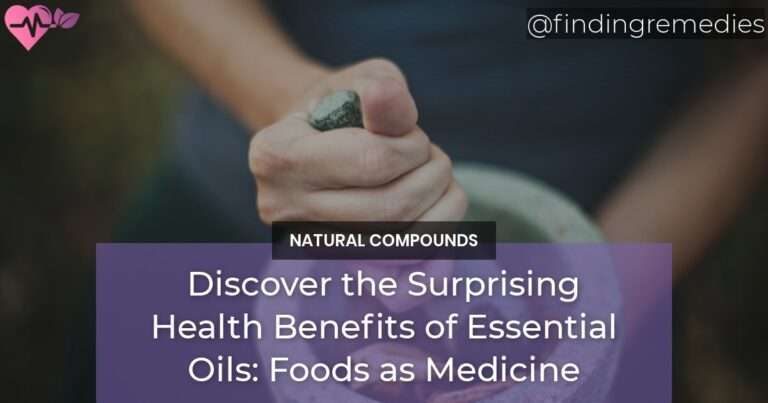Essential oils are gaining attention as a natural remedy for a variety of ailments. They are used in aromatherapy to promote relaxation, but did you know that essential oils have surprising health benefits? Essential oils can help to heal body, mind, and spirit when used correctly. Foods as Medicine is an ancient practice of using natural food remedies to help heal the body and improve overall health.
In this article, we will explore the surprising health benefits of essential oils and how you can use them in combination with foods as medicine to boost your health. Learn how essential oils can help to reduce inflammation, improve mental clarity, and even help promote weight loss. We’ll also discuss how to use essential oils to create your own healing meals. If you’re looking for a natural way to improve your health, essential oils and foods as medicine may be just what you need.
Table of Contents
Introduction
Essential oils have been used for centuries as a form of natural healing and alternative medicine. With the rise of holistic health, essential oils have also gained popularity in recent years. These plant-based extracts are known to offer a wide range of therapeutic benefits, making them a popular choice for aromatherapy and DIY remedies.
What are Essential Oils?
Essential oils are highly concentrated plant extracts that are obtained through a distillation process. They are extracted from different parts of the plant, such as the leaves, flowers, stems, and roots. The chemical composition of essential oils is what gives them their therapeutic properties. They are made up of a complex mixture of volatile compounds, including terpenes, phenolics, and alcohols.
Types of Essential Oils
There are over 90 types of essential oils, each with its own unique set of therapeutic benefits. Some of the most popular essential oils include lavender, peppermint, tea tree, eucalyptus, lemon, and rosemary. Essential oils can be used for aromatherapy, as well as for culinary purposes. They can be added to diffusers, lotions, shampoos, and other household products for their therapeutic benefits.
Sources of Essential Oils
Essential oils can be obtained from natural sources, such as plants, flowers, and herbs. They can also be synthesized in a laboratory to mimic the chemical composition of natural oils. However, natural sources are preferred as they contain a wider range of phytochemicals that offer a more comprehensive set of therapeutic benefits.
Health Benefits of Essential Oils
Essential oils offer a wide range of health benefits, including:
Aromatherapy and Symptom Management for Cancer Patients
Aromatherapy has been shown to be effective in managing symptoms of cancer, such as pain, anxiety, and depression. In a systematic review of 10 studies, it was found that essential oils can help improve the quality of life of cancer patients.
Anti-Cancer Properties of Citrus Essential Oils
Citrus essential oils have been found to have anti-cancer properties. In a study on the evaluation of anticancer activity of citrus essential oils against prostate cancer cells, it was found that these oils can induce apoptosis (cell death) in cancer cells.
Pain Reduction with Essential Oils
Aromatherapy has been shown to be effective in reducing pain in various chronic pain disorders, such as arthritis and fibromyalgia. In a systematic review and meta-analysis of 12 studies, it was found that aromatherapy can help reduce pain intensity and improve quality of life.
Effects of Essential Oils on Mood and Brain Activity
Inhalation of essential oils has been shown to have positive effects on mood and cognitive function. In a study on the effects of inhalation of essential oils on electroencephalographic activity and mood state, it was found that lavender essential oil can improve cognitive performance and increase feelings of relaxation.
Anti-Inflammatory Effects of Lavender Essential Oil
Lavender essential oil has been found to have anti-inflammatory effects. In a study on the effect of lavender essential oil on acute inflammatory response and oxidative stress induced by hydrogen peroxide in Wistar rats, it was found that lavender oil can reduce inflammation and oxidative stress in the body.
Safety and Risk Factors
Although essential oils are generally safe to use, there are some safety concerns and risk factors associated with their use. Some essential oils can cause skin irritation or allergic reactions when applied directly to the skin. They should always be diluted with a carrier oil before use. Essential oils should also not be ingested, as they can be toxic.
Conclusion
Essential oils offer a wide range of therapeutic benefits, making them a popular choice for natural healing and alternative medicine. With their anti-inflammatory, antioxidant, antimicrobial, and pain-relieving properties, they can help support overall health and well-being. However, it is important to use them safely and appropriately to avoid any potential risks or side effects.

